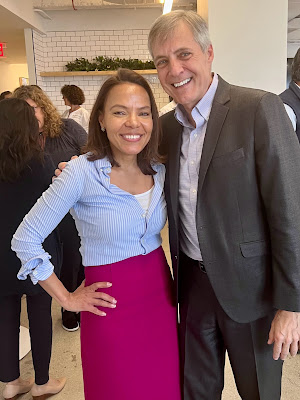In 2023, I haven't been as active reading books or posting Goodreads reviews. Since the pandemic, my reading has taken a back seat to doom-scrolling the news, streaming videos (highly recommended: "Only Murders in the Building"), and getting my heart broken by the New York Mets.
I wouldn't even have read the books I'm posting about here, save for the intervention of Mother Cabrini -- or, I should say, my colleagues at the Mother Cabrini Health Foundation who have been participating in a book club for the past year.
It's been a lot of fun... mostly because my younger, extremely smart, and very well-read colleagues are always choosing books that I would never have picked on my own. This has led to some exciting discoveries. Such as Exhibit 1:
 Tomorrow, and Tomorrow, and Tomorrow by Gabrielle Zevin
Tomorrow, and Tomorrow, and Tomorrow by Gabrielle ZevinMy rating: 5 of 5 stars
We have a book club at work, so I needed to read it and thought I wouldn't like it... not being a gamer, or even having an interest in gaming, and having never read anything by this author. I only knew it as "Bill Gates' favorite recent book." It turns out it's now my favorite recent book too. I was surprised and delighted. It was well-written, lyrical, and profoundly moving. I was underlining passages and often reacting out loud as I read. This is a wonderful book, in real life. Thank you, Ana, and thank you, Clare. Best book club pick. Ever.
 Take My Hand by Dolen Perkins-Valdez
Take My Hand by Dolen Perkins-ValdezMy rating: 4 of 5 stars
Nicely done. The story kept me interested, and the book inspired me to research the historical issues. This was a book club selection during Black History Month, and it has encouraged me to expand the range of what I read. This one reminded me somewhat of one of my all-time favorites, "To Kill a Mockingbird."
I could say just about the same for these four books:
 The Sympathizer by Viet Thanh Nguyen
The Sympathizer by Viet Thanh NguyenMy rating: 3 of 5 stars
I honestly couldn't finish this book. I found the writing pretentious and dense, and I kept thinking, "This writer needs an editor." Then I got to the scene with the squid, and I gave up.
And then, silly me, I read that this is the author's debut novel, and it won the 2016 Pulitzer Prize for Fiction.
I put this in the category of the Oscar-winning movie, "Everything Everywhere All at Once," which I also disliked. It's obvious I just don't get it, but it's also just as obvious I'll never win a Pulitzer or an Oscar. So I can't give this less than three stars on the basis of subjectivity.
Still, I won't be finishing this book. Life is too short. On a related note, here's The Onion weighing in this week about people who don't read the books they review on Goodreads 🙂 --> https://www.theonion.com/goodreads-no...
 The Long Game: How to Be a Long-Term Thinker in a Short-Term World by Dorie Clark
The Long Game: How to Be a Long-Term Thinker in a Short-Term World by Dorie ClarkMy rating: 3 of 5 stars
I really only learned one thing from this book: I had no idea there were that many consultants in the world.
 Conversations with People Who Hate Me: 12 Things I Learned from Talking to Internet Strangers by Dylan Marron
Conversations with People Who Hate Me: 12 Things I Learned from Talking to Internet Strangers by Dylan MarronMy rating: 4 of 5 stars
I admire Dylan Marron and his approach to humanizing social interactions on the Internet. Hate should not be a game. The perspective offered in this book is more life-affirming, and I now constantly think of Dylan's mantra that "empathy is not endorsement." I can only hope it makes me a more empathetic person in this new, odd, gamified world. A good, fast, uplifting read.
 How Magicians Think: Misdirection, Deception, and Why Magic Matters by Joshua Jay
How Magicians Think: Misdirection, Deception, and Why Magic Matters by Joshua JayMy rating: 4 of 5 stars
Trusting our inner child is a central lesson in this collection of anecdotes. The author adds insights that unveil the magician's mindset while encouraging self-reflection. After reading this book, I more deeply admire the dedication and professionalism of magicians, their tireless work behind the scenes, and their profound impact on our sense of wonder. Magic DOES matter.
 The Creative Act: A Way of Being by Rick Rubin
The Creative Act: A Way of Being by Rick RubinMy rating: 4 of 5 stars
I found this book full of encouragement and insight... however, I do not recommend listening to the Audible version, as I tried to. I'd give the Audible version only 3 stars. I did not think Rick Ruben was an effective narrator, but what he has to say is genuinely worthwhile. As an audiobook, it's seemingly an endless parade of aphorisms (i.e., "even spontaneity can improve with practice") that fly by too quickly to consider the proper context. If you read this book -- and if you are interested in the creative process, I DO highly recommend it -- consider purchasing a physical copy... and a companion workbook.

























